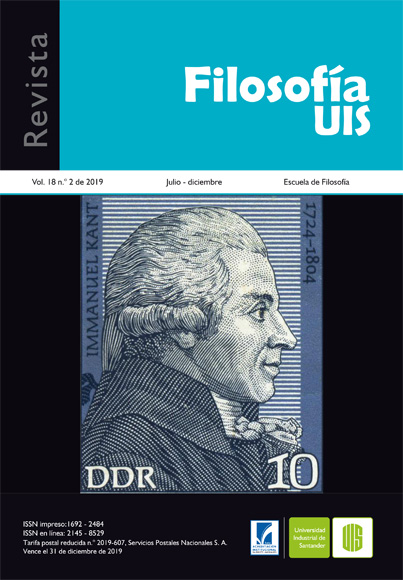Project of Theodor W. Adorno after Auschwitz
Published 2019-05-13
Keywords
- ethics,
- barbarims,
- categories of reason,
- factual realyty,
- Negative Dialectics
- ethics of resistence,
- metaphysics,
- subjetividad ...More
How to Cite
Copyright (c) 2019 Revista Filosofía UIS

This work is licensed under a Creative Commons Attribution 4.0 International License.
Abstract
This article traces the categories of Adorno's moral project from the barbarism experienced in the nazi concentration camps during the Second World War. For this, the author uses the strategy of thinking philosophy from the model of the Critical Theory of the Frankfort School. This novel project orients to the man or any idea of philosophy and ethics with sense, taking care of new categories of the factual reality. Specifically, Adorno builds a moral project that has as its foundation, first, a new framework for metaphysics and anthropology from Auschwitz and, second, aimed at preventing new expressions of barbarism like this from repeating themselves. Adorno exposes the ethical categories in Meditations on metaphysics in his work Negative Dialectics.
Downloads
References
Adorno, T. (1975). Dialéctica Negativa. (J. M. Ripalda, trad.). Madrid: Taurus.
Adorno, T. (1998). Minima Moralia: reflexiones sobre la vida dañada. (J. Chamorro, trad.). Madrid: Taurus.
Adorno, T. (1993). Sobre sujeto y objeto. En Consignas (pp. 143-158). (R. Bilbao, trad.). Buenos Aires: Amorrortu
Editores.
Barahona, E. (1996). Razón, verdad y crítica: momentos epistemológicos en la Dialéctica de la Ilustración de M. Horkheimer y T. W Adorno. Anales del Seminario de Metafísica, 30, 167-184.
Benjamin, W. (1998). Discursos interrumpidos I. (J. Aguirre, trad.). Madrid: Taurus.
Bernstein, J. M. (2001). Adorno: Disenchantment and Ethics. Cambridge: Cambridge University Press.
Cho, D. (2009). Adorno on Education or, Can Critical Self-Reflection Prevent the Next Auschwitz? Historical Materialism, 17, 74-97.
Escobar, J. (2009). Mito y reconciliación. Sobre el concepto de mito en la Dialéctica de la Ilustración. Areté. Revista de filosofía, 21(2), 381-400.
Gandler, S. (2009). Fragmentos de Frankfurt. Ensayos sobre la teoría crítica. Ciudad de México: Siglo XXI Editores.
Geyer, C. F. (1985). Teoría Crítica. (C. De santiago, trad.). Barcelona: Alfa.
Horkheimer, M. (1973). Crítica de la Razón Instrumental. (H. Murena y D. Vogelmann, trads.). Buenos Aires: Sur.
Horkheimer, M. (1986). Ocaso. (J. Ortega, trad.). Barcelona: Anthropos.
Horkheimer, M. (2000). Razón y autoconservación. En Teoría tradicional y teoría crítica (pp. 89-120). (J. López, trad.). Barcelona: Paidós.
Horkheimer, M. y Adorno, T. (1998). Dialéctica de la Ilustración: fragmentos filosóficos. (J. Muñoz, trad.). Madrid: Trotta.
López, P. (2011). Ocaso del individuo, recuerdo de lo vivo. Sujeto y naturaleza en Adorno. En J. Muñoz (ed.), Melancolía y verdad (pp. 33-70). Madrid: Biblioteca Nueva.
Muñoz, J. (2011). Melancolía y verdad. Invitación a la lectura de Th. W. Adorno. En J. Muñoz (ed.), Melancolía y verdad (pp. 13-24). Madrid: Biblioteca Nueva.
Schopenhauer, A. (2009). El mundo como voluntad y representación. (P. López, trad.). Madrid: Trotta.
Tafalla, M. (2003). Una filosofía de la memoria. Barcelona: Herder.
Zamora, J. (2004). Th. W. Adorno: pensar contra la barbarie. Madrid: Trotta.
